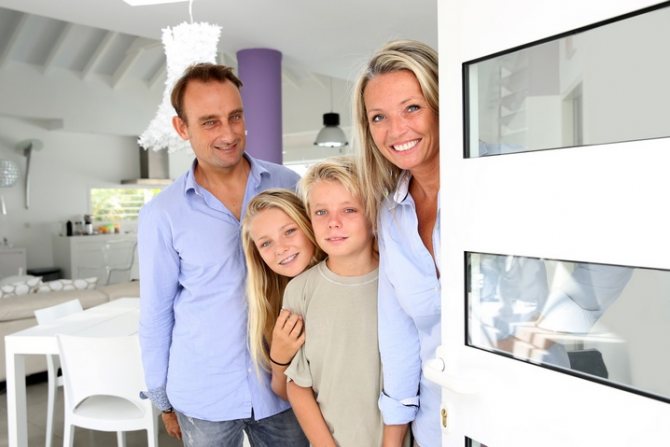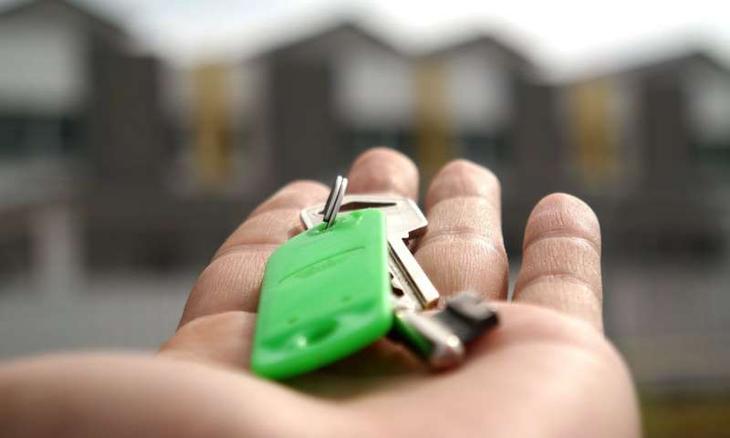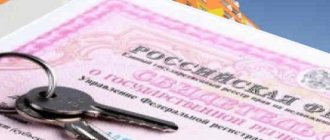Homeowner's rights
To begin with, there are 3 ways to own real estate:
- possession;
- use;
- order.
Moreover, only the right of ownership includes the entire 3 points. For example, if an apartment was provided to you a long time ago with the right of use and ownership by municipal authorities and was even inherited by several generations of close relatives, but you still have not privatized it with the state registration authority, then you will not be able to dispose of it (sell it to another person , donate, pawn). The right of disposal begins from the moment a record of ownership of specific property is made in the Unified State Register of Real Estate.
Thus, the owner has a full set of rights allowing him to dispose of personal property at his own discretion.
In some cases, the rights of the home owner are limited.
- With shared and joint ownership. To sell your share in this case, you need to notify the co-owner of the upcoming sale. Co-owners have the right of first refusal on the basis of Art. 250 Civil Code of the Russian Federation. Without a notarized refusal of the second owner to purchase the share, it is impossible to make a sale to another person. Otherwise, interested co-owners may challenge the transfer of rights in court.
- Encumbrances on the apartment. If the owner pledged his property for the purpose of a mortgage or to receive funds, then this is the basis for registering a restriction on the right to dispose of a land plot, or a house, or an apartment. It is not prohibited to sell mortgaged housing, but only with the permission of the bank.
- Seizure of property. This type of restriction imposes a complete ban on registration actions until the seizure is lifted; it is impossible to alienate property for any reason during this period.
Rights of the homeowner:
- Renting out premises for living. The tenants of your home, from the moment they sign the lease agreement, receive the right to use and own the property, without disposal.
- Gratuitous and compensated alienation of property (exchange, donation, inheritance, sale). Relinquishment of ownership.
- Registration of the owner and his family members in the apartment, as well as unauthorized persons at the request of the owner (registration and check-out).
- Use of living space for work activities (photo studio, tutoring, studio), provided that the rights of other apartment building owners are not violated.
- Carrying out redevelopment indoors.
Note! Redevelopment requires prior obtaining permission from local authorities, accompanied by the preparation of documents and a project.
The owner of housing in an apartment building has the right to use common property (corridor, basement, attic), but does not have the right to dispose of it - rent it out, renovate it; and also prohibit other apartment owners from having access to common areas.
What are the rights and obligations of the owner of a residential premises?
Lawyer Antonov A.P.
The owner of a residential premises has the right to own it, use it for residence or professional activities, and enter into transactions with it within the limits established by law. The owner is obliged to pay the costs of maintaining the housing, maintain it in proper condition, respect the rights and legitimate interests of neighbors, as well as the rules for the use of residential premises.
Types of residential premises In accordance with housing legislation, residential premises include a residential building (part of a residential building), apartment (part of an apartment) and a room (Part 1 of Article 16 of the Housing Code of the Russian Federation). A residential building (individual housing construction facility, individual residential building) is understood as a separate building with no more than three above-ground floors, no more than 20 meters in height, which consists of rooms and auxiliary premises intended to satisfy citizens’ household and other needs, associated with their residence in such a building, and is not intended for division into independent real estate objects (part 2 of article 16 of the RF Housing Code; clause 39 of article 1 of the RF Civil Code). An apartment is a structurally separate room in an apartment building, providing direct access to the common areas in such a building and consisting of one or more rooms, as well as auxiliary premises intended to satisfy citizens' household and other needs related to their residence in such a building. in a separate room (Part 3 of Article 16 of the Housing Code of the Russian Federation). A room is recognized as a part of a residential building or apartment intended for use as a place of direct residence of citizens in a residential building or apartment (Part 4 of Article 16 of the Housing Code of the Russian Federation).
Rights of the owner of residential premises The owner of residential premises has the right to own, use and dispose of it (clause 1 of article 209, clause 1 of article 288 of the Civil Code of the Russian Federation; part 1 of article 30 of the Housing Code of the Russian Federation). He has the right to perform any actions in relation to his property that do not contradict the law and do not violate the rights and legally protected interests of other persons. In particular, the owner can alienate his housing to other persons - sell, donate, bequeath, transfer as a contribution to the authorized capital of organizations, pledge the housing, transfer it to trust management and dispose of it in any other way (clauses 2, 4 of Art. 209, Article 1012, paragraph 1 of Article 1013 of the Civil Code of the Russian Federation). The owner of housing can use it for personal residence and residence of his family members, as well as provide housing to other persons for ownership and (or) use under rental agreements, free use or on other legal grounds (clause 2 of article 288 of the Civil Code of the Russian Federation ; part 2 of article 30 of the Housing Code of the Russian Federation). Along with living, the owner of a residential premises has the right to use it to carry out professional or individual entrepreneurial activities, provided that such use does not violate the rights and legitimate interests of other citizens, as well as the requirements that the residential premises must meet (clause 4 of the Rules, approved by Government Decree RF dated January 21, 2006 N 25). The owner of a residential premises has the right to transfer to another person the right to dispose of the residential premises on the basis of a notarized power of attorney (clause 1 of Article 185, clause 1 of Article 185.1, clause 2 of Article 209 of the Civil Code of the Russian Federation). Also, the owner of a residential premises has the rights of ownership, use and disposal, within established limits, of the common property of an apartment building (Article 290 of the Civil Code of the Russian Federation; Article 36 of the Housing Code of the Russian Federation). The owner of a residential premises has the right to take part in a general meeting of owners of premises in an apartment building, both personally and through a representative (Part 1 of Article 48 of the Housing Code of the Russian Federation). Also, the owner of a residential premises has the right to become a member of the HOA formed to manage an apartment building (Part 1, Article 135, Parts 1, 2, Article 143 of the Housing Code of the Russian Federation).
Responsibilities of the owner of residential premises The owner must exercise his rights in relation to the residential premises in accordance with its purpose and the limits of its use established by law. For example, the placement of industrial production and hotels in residential premises is not allowed (clause 3 of article 288 of the Civil Code of the Russian Federation; part 1 of article 30 of the Housing Code of the Russian Federation; clause 4 of Rules No. 25). The owner bears the burden of maintaining the property he owns (Article 210 of the Civil Code of the Russian Federation). In particular, he is obliged to pay for housing and utilities, and pay property tax for individuals. The obligation of the owners of premises in an apartment building to maintain common property has also been established (Part 3 of Article 30, Clause 5 of Part 2 of Article 153 of the RF Housing Code; Article 400, Clauses 1, 2, Clause 1 of Article 401 of the Tax Code of the Russian Federation; clause 28 of the Rules, approved by Decree of the Government of the Russian Federation of August 13, 2006 N 491). The owner of the housing is obliged to maintain it in proper condition, preventing mismanagement of it, to comply with the rights and legitimate interests of neighbors, the rules for the use of residential premises, as well as the rules for maintaining the common property of the owners of premises in an apartment building. Thus, the owner must carry out the reconstruction or redevelopment of residential premises in compliance with the requirements of the law and in agreement with the local government (Part 1, Article 26, Part 4, Article 30 of the Housing Code of the Russian Federation). For the owner of a residential premises, decisions of the general meeting of owners of premises in an apartment building, adopted in the prescribed manner (Part 5, Article 46 of the Housing Code of the Russian Federation), are mandatory.
Responsibility of the owner of a residential premises In case of non-payment of mandatory payments due to the presence of residential premises in the property of a citizen, the debt can be forcibly collected at the expense of the property of the owner (Article 48 of the Tax Code of the Russian Federation; Article 69 of the Law of October 2, 2007 N 229-FZ). If the owner of a residential premises uses it for other purposes, systematically violates the rights and interests of neighbors, or mismanages the housing, allowing it to be destroyed, the local government body may warn the owner of the need to eliminate the violations, and also set a proportionate period for repairing the premises. If the owner, after warning, continues to violate the rights and interests of neighbors or uses the property for other purposes or fails to make the necessary repairs without good reason, the court, at the request of the local government body, may decide to sell such premises at public auction with payment to the owner of the proceeds from the sale minus expenses for the execution of a court decision (Article 293 of the Civil Code of the Russian Federation; clause 10 of the Resolution of the Plenum of the Supreme Court of the Russian Federation dated July 2, 2009 N 14). If the owner carries out unauthorized redevelopment and (or) reconstruction of the residential premises, violating the rights and legitimate interests of citizens or creating a threat to their life or health, if the owner refuses to restore the residential premises to their previous condition, it can also be sold at public auction (clause 1 of Part 1. 5, Article 29 of the Housing Code of the Russian Federation).
Sincerely, lawyer Anatoly Antonov, managing partner of the law firm Antonov and Partners.
Still have questions for your lawyer?
Ask them right now here, or call us by phone in Moscow +7 (499) 288-34-32 or in Samara +7 (846) 212-99-71 (24 hours a day), or come to our office for a consultation (by pre-registration)!
Responsibilities of the property owner
The main responsibility of the home owner is to maintain its condition in proper condition.
- Payment of property tax. Paid in proportion to the share in the right of common ownership.
- Contribution of funds towards future major repairs of an apartment building.
Note. The first two points apply only to homeowners. Persons who have not yet privatized housing are exempt from such contributions.
- Payment of utility services.
- Take into account the interests of neighbors (do not violate their rights, do not make noise from 22.00, as well as from 13.00-15.00) and the rules for using residential premises. Carrying out repair work during lunchtime is not allowed due to the rest of small children living in the house.
The owner of the property and his family members are prohibited from:
- Carry out redevelopment in the apartment without permission from the authorities, in order to avoid causing damage to the apartment building (violation of the integrity of communications, damage to load-bearing walls);
- Use the apartment for the purpose of conducting production and carrying out missionary activities (Article 17 of the Housing Code of the Russian Federation);
- Failure to comply with fire safety requirements, as well as sanitary, hygienic, environmental and other legal requirements (Article 17 of the Housing Code of the Russian Federation);
- Engage in illegal activities that may result in criminal prosecution (for example, possession of controlled substances).
Nuances
The right to use residential premises of homeowners presupposes the existence of rights to use, dispose of and own common property. To increase or decrease its volume, the consent of all legal owners of apartments in the apartment building is required. A similar requirement must be met in the case of transfer of public facilities for operation to third parties. To obtain the consent of the owners, a general meeting is organized.
The transfer of common property for use to third parties is permitted if this does not entail a violation of the rights of the owners of residential premises. For example, it is unacceptable to transfer a basement for use to a person planning to set up a store in it. Otherwise, access to engineering systems may be difficult.
Can an owner lose his apartment for failure to fulfill his obligations to maintain housing?
In certain cases, the owner of an apartment may actually lose his right to housing. But this happens only by court decision.
There is Article 293 of the Civil Code of the Russian Federation, the name of which speaks for itself - “termination of ownership rights to mismanaged residential premises.” Refusal by the owner of the property to fulfill responsibilities for the maintenance and repair of the premises, as well as violation of public order, is grounds for taking strict measures against the owner. First, the authorities issue a warning and set deadlines for repair work, and then a decision can be made to sell the apartment at public auction. The initiator is the administration, and the decisions are made by the court. The proceeds from the sale of the apartment are used to repair the premises and compensate for damage caused by the negligence of the former owner. After repairs and compensation for damage, the remaining funds are transferred to the lost former owner of the apartment.
The emergence of property
The law assigns to the owners of premises in apartment buildings the responsibility for maintaining common property. Each subject bears expenses in the amount corresponding to the share belonging to it. A similar rule applies to rooms - parts of a communal apartment.
Subjects have rights to residential premises for various reasons. An object can pass to a person as a result of a gift, inheritance, under a contract of sale, exchange, etc. Real estate transactions must be carried out in strict accordance with the law.
The Civil Code stipulates the requirement for mandatory state registration of actions with objects. The procedure for execution of transactions is regulated by the norms of 122-FZ. Based on the results of state registration, the applicant receives a document of a unified form confirming the rights to residential premises.
All homeowners have rights arising as a result of any significant legal grounds, which may include:
- Independent construction of a private residential building on a personal plot of land;
- Right of acquisitive prescription (with a tenure period of at least fifteen years);
- Abandoned property (when the owner voluntarily abandoned it in due course);
- Legalization of unauthorized construction through the court;
- Concluding a transaction for the purchase and sale of an apartment, room, house;
- Signing a housing exchange agreement;
- Receiving a deed of gift free of charge;
- Lifetime or perpetual annuity;
- Receiving an inheritance in accordance with the legal order or by will;
- Privatization of municipal housing;
- Participation in a housing construction cooperative with full payment of share contributions;
- Participation in shared construction (new buildings).
Regardless of the grounds on which the housing was acquired, ownership rights arise exclusively after the owner obtains state registration. At the same time, cases when you have to confirm your rights in court are also taken into account. In addition, it is through the court that you often have to confirm your authority as the legal owner of a real estate property.
Housing legislation provides for cases of using housing for commercial activities, as well as arranging premises for industry. In order to avoid problems with the law, the owner must transfer the property to non-residential use.
It is also important to know the reasons why property rights may be lost. They do not always depend on the owner himself, but in general they are:
- Sale, exchange, registration of a deed of gift or other transaction for the alienation of property in which ownership is transferred from one citizen to another;
- Foreclosure on the owner's real estate, for example, if we are talking about an object that is pledged to someone and the owner did not fulfill his obligations within the prescribed period or the obligations of the owner of the residential premises were not fulfilled (the decision is made by the court);
- The fact of alienation of housing, when we are talking about a private house, the land under which was seized for state needs or the needs of the municipality.
Sometimes it happens that the rights of the owner are terminated illegally. Here you must immediately file a claim in court to restore your rights. The housing issue, as well as the inherent burden of maintaining real estate, cannot be neglected.
Apartment owner and registered persons: general rights
The persons living in the apartment are not always its owners. As a rule, there is only one owner of a property. The rest are either his family members or persons living under a lifelong maintenance agreement. In some cases, a person is registered in the living space who received the premises in his own favor by virtue of a will.
In accordance with the Housing Code, the rights of the owner and the registered owner are equal if the second is a member of his family. It is legally established that only spouses, children and their parents are recognized as family members. However, if they want to start an individual business in the apartment, rent out a room, or make redevelopment, they must obtain the consent of the owner of the property.
If family relationships have ceased, then former family members do not have the right to claim living space, with the exception of:
- if a minor child was registered in the apartment, then its owner does not have the right to evict him;
- the right to use a property may be revoked by the court if former family members cannot provide themselves with housing. Often, court proceedings come down to forcing the owner to provide other housing for his former family.
At the same time, a former spouse can legally reside if he has not been deregistered and there is no corresponding court decision. In this case, you can evict a former family member only when selling the apartment, but you will need to go to court. Thus, the rights of the apartment owner during a divorce are limited by the property status of the other party and the presence of children. In accordance with the Family Code, the latter can continue to use the housing.
It is not uncommon for relatives to live in the living space. In accordance with Article 40 of the Constitution of the Russian Federation, any person cannot be deprived of housing. Thus, if their property situation is better, then they have every right to use the apartment in which they are registered.

Often, conflicts arise between owners and registered persons regarding the joint use of housing. You can protect yourself from headaches by concluding a marriage contract with your significant other, an annuity agreement, or a lifelong maintenance agreement. In this case, each party will be guided by the rights to housing recorded in the official document.
If the housing is non-privatized, then when it is privatized, everyone registered automatically becomes the owner. In accordance with Federal Law No. 189, it is impossible to deregister an individual who was registered in an apartment at the time of privatization. At the same time, neither the current owner, who became the owner of the property during the privatization process, nor the owner who received the apartment as a gift, by will or upon purchase, can evict him.
Unconditional and conditional tenants
The main right of the owner of residential property and his family members is residence. Referring to what was said in the previous section, we should dwell in more detail on the family members of the home owner.
We invite you to read: Changing the amount of child support: increasing or decreasing payments, grounds, procedure and conditions, court decisions, practical advice
| Group of relatives | Who to relate to | What rights do they have? |
| Unconditional (not required to maintain a common household with the owner of the residential property) | Spouses, biological and adopted children, parents and adoptive parents | Live in a residential area, use the property located on it, register with the consent of the owner and move out at any convenient time |
| Conditional (required to live with the owner of the property in the same area and maintain a common household) | Relatives who are not unconditional, as well as dependent persons who are officially recognized as disabled |
Despite the fact that when family ties with the owner of the apartment are terminated, a person loses the opportunity to continue living there, there are some exceptions, namely:
- Lack of other suitable premises for living - the issue is resolved through the court. If the period that this body has established for extending residence has expired and the person has not found other housing, only then will he be forcibly evicted;
- It is impossible to evict a spouse to whom the owner of a residential property pays alimony.
Emergency houses
If an authorized body of state power (local government) recognizes a residential apartment building as unsafe, the structure is subject to demolition or reconstruction. The specified body has the right to present the owners of premises in such an apartment building with a demand for demolition or reconstruction. If the subjects do not comply with this requirement within the established time frame, the site on which the emergency facility is located is withdrawn for state (municipal) needs. Accordingly, all premises located in the apartment building are subject to seizure, except those that are the property of the municipality.

If, in relation to the site on which a dilapidated residential building is located, a decision has been made to develop the territory, the body that issued such an act must present to the owners a requirement for the demolition or reconstruction of the object, and also set a period of at least 6 months. to submit an application for a permit for construction, reconstruction or demolition.





